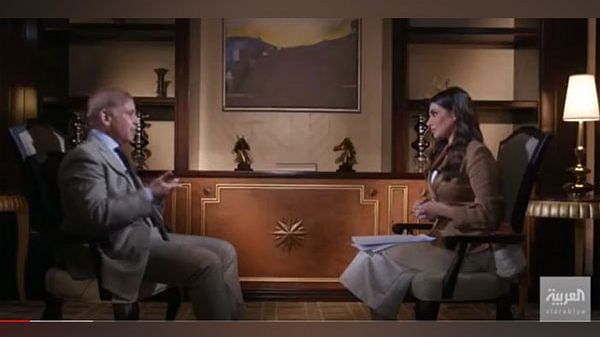Pakistan, the habitual offender, has once again extended an olive branch to India and expressed its desire for peace talks. It is a déjà vu moment for New Delhi. Pakistan Prime Minister Shehbaz Sharif recalled multiple wars with India and lamented that “conflicts brought nothing good to any side but misery and poverty”. Sounding more like a peacenik ready to receive the Nobel Peace Prize, he even prophesied as to ‘who will live to tell what happened, if God forbid a battle starts, as both sides are nuclear powers’. New Delhi is certainly not amused yet silently watching as the economic situation in Pakistan turns from bad to worse.
This is not the first time that a Pakistani prime minister is extending the hand of friendship towards India.
The country’s political leaders as well as the generals in the Pakistan Army, who are the real rulers in Islamabad, have routinely called for friendly relations between the two neighbours and an end to hostilities. But every such pro-peace statement is invariably followed by a rider to “settle the long-pending issue of Kashmir”. The generals on their part will not forget to punctuate their peace calls with a warning that the Pakistan Army is capable of giving a fitting reply to the Indian Army in the battlefield, whatever that means.
Where is the preparation for talks?
Sometime in January last year, then-army chief General Qamar Javed Bajwa had pontificated that Pakistan is committed to the idea of mutual respect and peaceful co-existence and it is time to extend a hand of peace in all directions. Interestingly, this peace advice came from a general who had spewed venom against India after the aerial strikes at the terror training camps in Pakistan-occupied Kashmir in 2019 after the Pulwama attack. Even Shebaz Sharif’s olive branch to New Delhi comes with a rider asking his Indian counterpart Narendra Modi to ‘resolve Kashmir and other issues through dialogue’. What the other issues are is obviously not explained.
He also mentioned the plights of Kashmiris, pointing out human rights violations in Kashmir. The hard fact is that no prime minister of Pakistan can sell his or her idea of talks with India without mentioning Kashmir. It is evident from the 2015 post-Ufa joint communique in Russia that did not mention Kashmir.
Peace talks between India and Pakistan need a good amount of preparation, homework and strong track-two diplomatic exercises. When New Delhi decided to abrogate Article 370 of the Constitution, a good number of calculations about possible reactions from Pakistan must have been carried out. It was necessary to “inform” the establishment in Islamabad that it would be futile to carry its opposition to the move beyond a particular point. Contrary to the attitude of earlier dispensations, the Narendra Modi government drew a new red line for Pakistan vis-à-vis Jammu and Kashmir.
While Nawaz Sharif, who attended Modi’s oath-taking ceremony in 2014, did not meet any J&K separatists, New Delhi cancelled foreign secretary-level talks because Pakistan’s high commissioner in New Delhi did. It is possible that in the subsequent “track-two” meetings, the Pakistani side was warned that Article 370 will go and that Islamabad should realise that it is dealing with a new and different India under Modi.
Also read: Vajpayee to Modi, why India-Pakistan secret peace dialogues on Kashmir have always failed
Where is Pakistan’s strong Centre?
Similarly, it appears that Islamabad has realised, thanks to a string of track-two meetings, the potential of a strong central government in India in punishing Islamabad for any misadventure and carrying out a repeat of 1971. From Defence Minister Rajnath Singh to serving Army generals and through track-two talks, India has conveyed to Pakistan in all the languages it would understand that they should better be prepared to deal with a new India.
Islamabad cannot boast of a strong and popular central government that can tackle multi-front conflicts if a situation arises. When Interior Minister Rana Sanaullah warned of military action against the Afghanistan-based hideouts of the Tehreek-e-Taliban Pakistan (TTP), the latter hit out by tweeting the photograph of the 1971 infamous Pakistan Army surrender to India.
Even as food riots are increasing in Pakistani cities and the economic situation is worsening each day, the World Bank has delayed the approval of two loans worth $1.1 billion until the next fiscal year. The World Bank has also decided to withhold approval of the second Resilient Institutions for sustainable Economy loan and second Programme for Affordable Energy–both worth $450 million and $600 million. Dealing yet another blow, one US Congressman has tabled a legislation seeking termination of Pakistan’s designation as a major non-Nato ally.
PM Sharif needs to prepare his team of advisors for the next round of track-two talks with India to be forewarned of more “new red lines”. Meanwhile, as for his peace proposals, New Delhi can safely say, “it is too early to comment.”
Seshadri Chari is the former editor of ‘Organiser’. He tweets @seshadrichari. Views are personal.
(Edited by Prashant)



